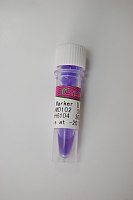DNA-based Studies Processing of Microdissected Tissue for Molecular Analysis
互联网
DNA-based Studies
These methods were successful in our lab using prostate tissue and for our specific objectives. Investigators must be aware that they will need to tailor the following protocol for their own research objectives and tissue under study.
Less than 10,000 Cells
If the number of cells procured is minimal, e.g., dissection of pre-malignant lesions, then a simple proteinase K treatment prior to PCR is recommended.
Formalin-fixed, Paraffin-embedded Tissue
PCR amplification of DNA recovered from standard formalin-fixed, paraffin-embedded tissue is possible and allows investigators to perform studies on archival patient material. Studies on processed tissue have the general advantages of abundant samples for study, high quality of histologic detail for studying dysplastic and pre-malignant lesions, and frequent availability of follow-up clinical information on patients. However, these studies are often technically challenging. The type of fixative used and the fixation time impact heavily on the quality of the DNA recovered after microdissection, thus PCR amplification signals may be widely disparate among samples in a study.
Other Fixatives
Fixatives containing heavy metals or low pH should be avoided. Non-formalin-based fixatives generally result in recovery of better quality DNA and may become increasingly important for routine processing of tissue samples in the future as the field of molecular pathology evolves.
Timing
Routine care in tissue processing is also helpful, including immediate processing of samples after surgery and slicing of tissue samples into thin sections to allow rapid penetration of fixative. Over fixation (>24 hours) should be avoided.
上一篇:RNA-based Studies Processing of Microdissected Tissue for Molecular Analysis 下一篇:Manual Microdissection 显微解剖









